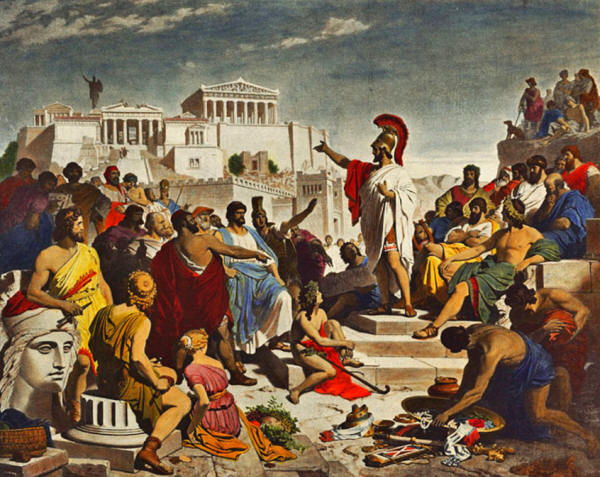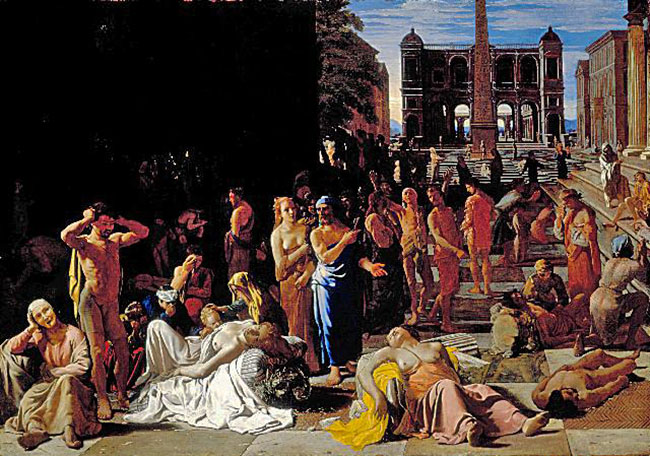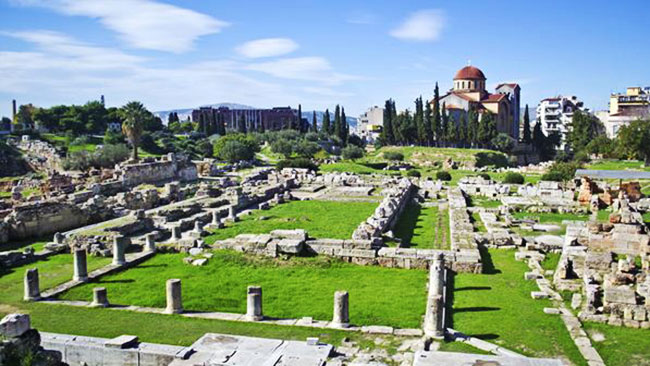|
Our histories are riddled with accounts
of famines, wars, pestilences, and of course, plagues...
It entered the city after decimating an estimated 75,000 to 100,000 inhabitants who lived in the city and near its port of Piraeus; Athens' only port for food and supplies.
Before the plague, it was believed that the Athenians would win the war. The outbreak shattered that belief.
In today's climate of panic and hysteria surrounding the Coronavirus, it's interesting to reflect on our predecessors' experiences when facing an invisible enemy.
as seen from Philopappou Hill. A. Savin/Wikimedia Commons
As the war between the Delian League (Athens and supporting city-states) and the Peloponnesian League (Sparta and supporting city-states) raged on,
After repeated skirmishes, more and more inhabitants of the Attica countryside began moving towards Athens and the city walls for protection.
It didn't take long for this shifting populace to
start overcrowding the already busy streets of the city.
With the increased numbers within
the city, the navy could not supply enough food to meet the demand.
The plague was indiscriminate, and the death-toll grew rapidly, claiming even the lives of Pericles, his wife, and their two sons...
Pericles' Funeral Oration by Philipp Foltz (1852). Pericles' Funeral Oration was a famous part in Thucydides' The History of the Peloponnesian War.
Physicians at the time didn't understand what
caused it, or how it was spreading so quickly, and were unable to
treat the symptoms. In fact, they often died quicker than their
patients due to multiple exposures to the infected.
Once the navy was exposed to this epidemic, it was only a matter of time before Athens would become infected; it is thought that an estimated 25% of the population died as a result.
As a result,
society's morals disappeared, and lawlessness became the new norm.
They believed there was no point in acting with honor, as they wouldn't live long enough for this to matter.
MICHAEL SWEERTS
The greater their exposure, the more likely it became that they would die.
One such mass grave was discovered at Kerameikos, outside of Athens, with 240 bodies interred, 10 of which were children - all victims of the plague.
As the disease wore on, those who survived developed an immunity, which allowed for them to care for those who would become ill.
There may have been some semblance of gratitude from patient to carer, as many of the city's inhabitants felt abandoned by their gods.
A Sick Child Brought Into
the Temple of
Aesculapius
Thucydides, however, cites this behavior as the city's residents simply being superstitious.
With many of the poorer inhabitants inheriting wealth from their
deceased family, the power balance between the rich and poor shifted
dramatically.
Thucydides backs this up, stating that the most sympathetic to the plights of others were those who had contracted and survived the disease themselves.
However, a large number of these survivors were eventually
discovered to have been "metics" (a foreign resident of Athens who
did not have citizen rights in their Greek city-state of
residence) - that is, 'illegal citizens' - who did not have rights and
protections as a legal Athenian citizen.
These laws not only significantly reduced the rights and well-being of the remaining metics, but also resulted in a decreased number of available soldiers for the Athenian military, as well as a decrease in the political power of Athens herself.
Taken at Athens, greece, April 2011 (public domain)
In time, Athens would be defeated by Sparta, and their place in history, as a major power in Ancient Greece, would become forfeit...
But, just like the Athenians, if we only focus on that,
instead of following good hygiene and keeping a respectful distance
of others, we will likely face a similar fate.
We can learn much from our ancient forebears, and the best lesson is,
That way, we leave a fine example for history to
share with future generations.
|







